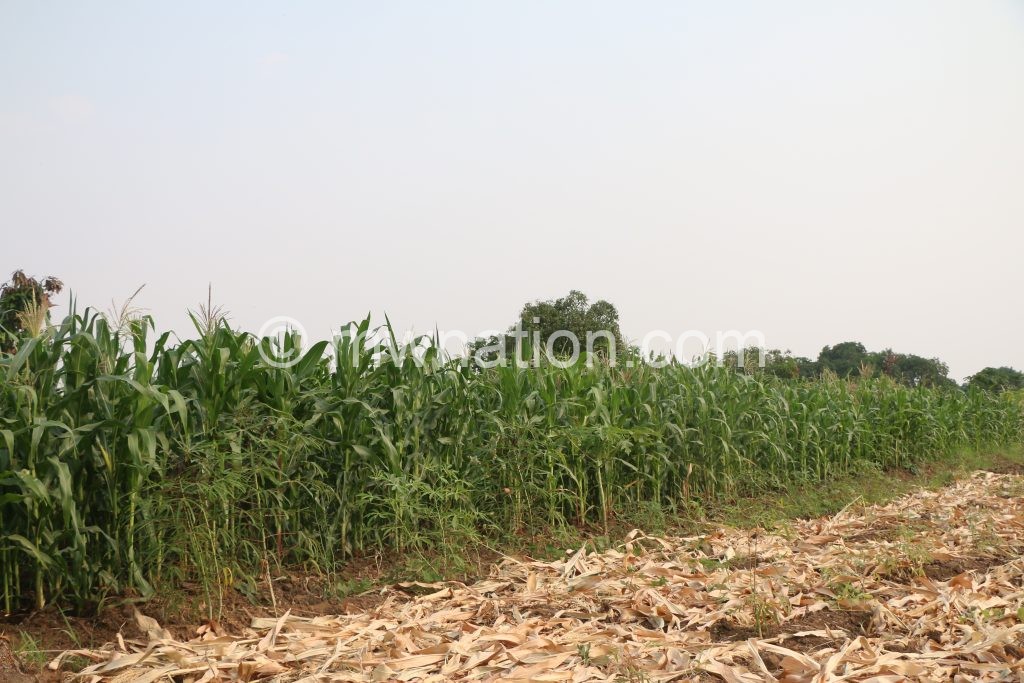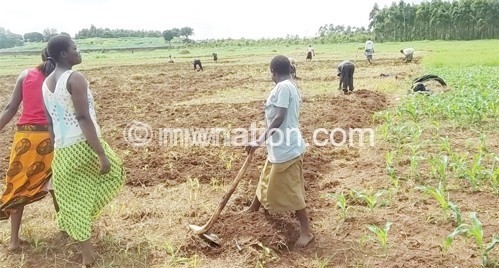Women still struggling to own land
When she lost her husband in 2015, Agnes Joseph, 35, from Denje Village in the area of Traditional Authority Mwansambo in Nkhotakota District, thought her life was over when the family, she married to turned against her.
With four children to feed from the two acres piece of land, she had hope that even though her husband had passed on, she would be able to grow crops and fend for her family.

However, things did not go in her favour, as the land she was counting on was unlawfully grabbed from her by the late husband’s brother.
With no papers to back herself that the land belonged to her and the children, she had no option than to return to her parents home in the same district with the hope of finding a small piece of land to cultivate crops for survival.

She says: “It was a tough experience. The people I thought were my relations ended up betraying me. I had to gather courage and leave my husband’s home because I do not work and farming on that piece of land was our only way of surviving.”
After enquiring from a number of authorities in the area, Agnes was given back her land and she is currently happy to be able to grow crops which helps her family with food and money.
For many women like Agnes whose have had their land grabbed, the coming in of the customary land committees will help to reduce cases of land grabbing from widows and orphans.
Gift Chingalangala, a member of Denje Village customary land committee says women in the area will now be respected and be at liberty to use the land left by their husbands without fear of it being grabbed.
“This will help us a lot. Now that everyone will have documents for their land. No one will be able to claim that the land is theirs. This will promote peace and community development,” he says.
President Lazarus Chakwera in his State of the Nation Address on September 4, 2020, talked about the need to ensure that land is protected and utilized to benefit the people of Malawi.
Chakwera further articulated how his administration is rolling out land reforms which are currently being piloted in eight districts of Phalombe, Rumphi, Nkhotakota, Mchinji, Chikwawa, Nsanje, Karonga, and Kasungu.
Before the president’s statement, the Ministry of Lands was already on the ground with the pilot survey which among other things targets how land is being registered.
According to Ministry of Lands principal secretary Bernard Sande the pilot phase was to provide lessons on systematic land management and administration through the registration of customary land parcels.
He says the trend so far is different from district to district as in matrilineal marriage systems, most women are either registering their customary land parcels in their own names, children’s names, or family names (as families in joint registration), with some registering their land in family names.
“This is the trend in Phalombe. Again, more women registered their customary land parcels than the men. In this society, men are mostly not accorded customary land ownership as preference is made to females and their daughters as rightful heirs. In Rumphi, it is slightly different because more men registered their land in either their own names or as families. Some women registered in their own right, a few registered jointly with their wives. This is so due to the patrilineal marriage system which is mostly practiced in Rumphi,” Sande said.
Sande says another observation in the pilot phase is that joint land registration between husbands and wives is working better in matrilineal communities, while individual land registration is common practice in patrilineal societies that prefer men and male children as rightful heirs of customary land.
He added that one possible weakness of the new land laws that may be there during initial stages of parcel demarcation, and may need review, is the aspect of a single Land Clerk for each and every Traditional Authority which is now called Traditional Land Management Area (TLMA) as provided for in the new law.
Centre for Human Rights and Rehabilitation (CHRR) executive director, Michael Kaiyatsa, says it is very unfortunate that women are a majority in the country and yet still lagging behind when it to comes to land ownership.
“We have seen cases of women being destitute following the death of their husbands just because they lost their land to their spouse’s relatives. Of course, the land laws were passed in 2015 to address such challenges but going by the strongly patriarchal nature of our society much more needs to be done to ensure equal rights for women and men in Malawi on land ownership,” he said.
Customary Land Act and other land related laws ensure that people’s land parcels are protected from preventable disputes that emanate from informal and outrageous land acquisition tendencies in communities.
The law is formalising the roles of traditional leaders in adjudicating and managing customary land, as opposed to the previous arrangement which was just a delegated role without any legal framework.
The new laws have touched on sticky areas of land administration and acquisition, such as the need for appropriate compensation when one is losing land parcel or part of it to any prospective developer.
—





